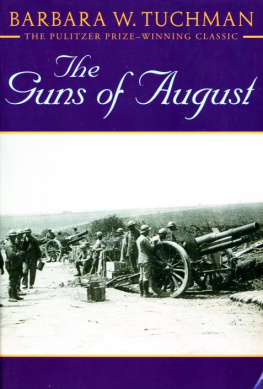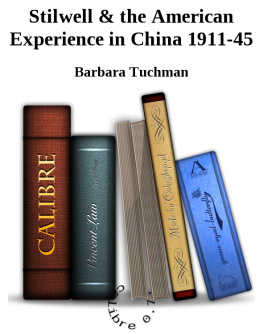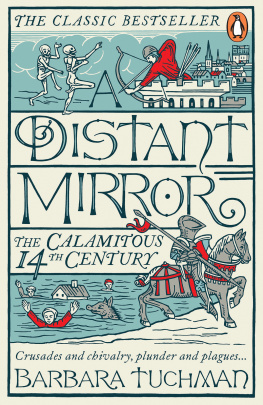Barbara W. Tuchman
The Guns
of August
BALLANTINE BOOKS * NEW YORK
Foreword
During the last week of january, 1962, John Glenn delayed for the third time his attempt to rocket into space and become the nations first earth-orbiting human. Bill Moose Skowren, the Yankees veteran first baseman, having had a good year (561 at bats, 28 home runs, 89 runs batted in), was given a $3,000 raise which elevated his annual salary to $35,000. Franny and Zooey was at the top of the fiction bestseller list, followed a few notches down by To Kill a Mockingbird. At the top of the non-fiction list was My Life in Court by Louis Nizer. That week also saw the publication of one of the finest works of history written by an American in our century.
The Guns of August was an immediate, overwhelming success. Reviewers were enthusiastic and word-of-mouth quickly attracted readers by the tens of thousands. President Kennedy gave a copy to Prime Minister Macmillan, observing that somehow contemporary statesmen must avoid the pitfalls that led to August, 1914. The Pulitzer Committee, forbidden by the donors will to reward a work on a non-American subject with the Prize for History, found a solution by awarding Mrs. Tuchman a Prize for General Nonfiction. The Guns of August made the authors reputation; her work thereafter was gripping and elegant, but most readers needed only to know that the new book was by Barbara Tuchman.
What is it about this bookessentially a military history of the first month of the First World Warwhich gives it its stamp and has created its enormous reputation? Four qualities stand out: a wealth of vivid detail which keeps the reader immersed in events, almost as an eyewitness; a prose style which is transparently clear, intelligent, controlled, and witty; a cool detachment of moral judgementMrs. Tuchman is never preachy or reproachful; she draws on skepticism, not cynicism, leaving the reader not so much outraged by human villainy as amused and saddened by human folly. These first three qualities are present in all of Barbara Tuchmans work, but in The Guns of August there is a fourth which makes the book, once taken up, almost impossible to set aside. Remarkably, she persuades the reader to suspend any foreknowledge of what is about to happen. Her narrative sets in motion a gigantic German Armythree field armies, sixteen army corps, thirty-seven divisions, 700,000 menwheeling through Belgium, marching on Paris. This tidal wave of men, horses, artillery and carts is cascading down the dusty roads of northern France, sweeping implacably, apparently irresistably, toward its goal of seizing the city and ending the war in the West, just as the the Kaisers generals had planned, within six weeks. The reader, watching the Germans advance, may already know that they wont arrive, that von Kluck will turn aside and that, after the Battle of the Marne, millions of men on both sides will stumble into the trenches to begin their endurance of four years of slaughter. And yet, so great is Mrs. Tuchmans skill that the reader forgets what he knows. Surrounded by the thunder of guns, the thrust and parry of bayonet and sabre, he becomes almost a participant. Will the exhausted Germans keep coming? Can the desperate French and British hold? Will Paris fall? Mrs. Tuchmans triumph is that she makes the events of August, 1914, as suspenseful on the page as they were to the people living through them.
When The Guns of August appeared, Barbara Tuchman was described in the press as a fifty-year-old housewife, a mother of three daughters, and the spouse of a prominent New York City physician. The truth was more complicated and interesting. She was descended from two of the great intellectual and commercial Jewish families of New York City. Her grandfather, Henry Morgenthau, Sr., was Ambassador to Turkey during the First World War. Her uncle, Henry Morgenthau, Jr., was Franklin Roosevelts Secretary of the Treasury for over twelve years. Mrs. Tuchmans father, Maurice Wertheim, had founded an investment banking house. Her childhood homes were a five-story brownstone on the Upper East Side, at which a French governess read aloud to her from Racine and Cor-neille, and a country house with barns and horses in Connecticut. There were dinners with a father who had forbidden mention of Franklin D. Roosevelt. One day, the adolescent daughter transgressed and was commanded to leave her chair. Sitting very straight, Barbara said, I am too old to be sent away from the table. Her father stared in amazementbut she remained.
When the time came for Mrs. Tuchman to graduate from Radcliffe, she skipped the ceremony, preferring to accompany her grandfather to the World Monetary and Economic Conference in London where he headed the U.S. delegation. She spent a year in Tokyo as a research assistant for the Institute of Pacific Relations, and then became a fledgling writer at The Nation, which her father had bought to save it from bankruptcy. At twenty-four, she covered the Spanish Civil War from Madrid.
In June, 1940, on the day Hitler entered Paris, she married Dr. Lester Tuchman in New York City. Dr. Tuchman, about to go off to war, believed that the world just then was an unpromising place to bring up children. Mrs. Tuchman replied that if we wait for the outlook to improve, we might wait forever and that if we want a child at all, we should have it now, regardless of Hitler. The first of their daughters was born nine months later. During the forties and fifties, Mrs. Tuchman dovetailed raising children and writing her first books. Bible and Sword, a history of the founding of Israel, appeared in 1954; The Zimmermann Telegram followed in 1958. The latter, an account of the German Foreign Ministers 1917 attempt to lure Mexico into war with the United States by promising the return of Texas, New Mexico, Arizona, and California, written with high style and wry humor, was a taste of things to come.
Over the years, as The Guns of August was followed by The Proud Tower, Stilwell and the American Experience in China, A Distant Mirror, The March of Folly, and The First Salute, Barbara Tuchman came to be regarded almost as a national treasure. People wondered how she did it. In a number of speeches and essays (collected into a volume titled Practicing History), she told them. The first, indispensable quality she declared was being in love with your subject. She described one of her professors at Harvard, a man passionately in love with the Magna Carta, remembering how his blue eyes blazed as he discussed it and how I sat on the edge of my seat then too. She admitted how depressed she was years later by meeting an unhappy graduate student forced to write a thesis, not on a subject about which he was enthusiastic, but which had been suggested by his department as needful of original research. How can it interest others, she wondered, if it doesnt interest you? Her own books were about people or events which intrigued her. Something caught her eye, she looked into it, and, whether the subject was obscure or well-known, if she found her curiousity growing, she kept going. In the end, she managed to bring to each of her subjects new facts, new perspectives, new life, and new meaning. Of this particular August, she found that there was an aura about 1914 that caused those who sensed it to shiver for mankind. Once she communicates her own fascination, her readers, bourne along by her passion and skill, never escape her narrative clutch.
She began with research; that is, by accumulating facts. She had read widely all her life, but her purpose now was to immerse herself in this time and these events; to put herself at the elbow of the people whose lives she was describing. She read letters, telegrams, diaries, memoirs, cabinet documents, battle orders, secret codes, and





